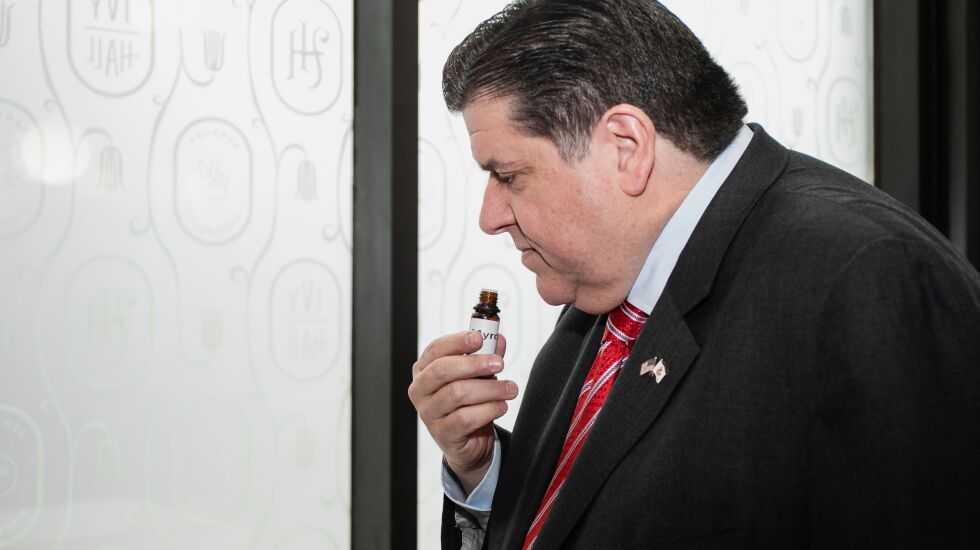
After smelling cannabis-scented oils at Ivy Hall, a new Bucktown dispensary co-owned by a Black father and son, Gov. J.B. Pritzker said he hopes the stage is set for diversity to finally weed its way into the state’s nearly all-white marijuana industry.
“As the first of 192 social equity licensees to launch, Ivy Hall is paving the way for even more success in this new industry,” Pritzker said at a grand opening Wednesday for the dispensary at 1720 N. Damen Ave.
Nigel Dandridge, a Loyola University Chicago graduate, and his father, John, a retired CPS teacher and military veteran, are majority owners of the business.
“I am living proof of Illinois making good on its promise to carve out a more equitable cannabis landscape for generations to come,” Nigel Dandridge said.
David Berger, a principal at Birchwood Capital, and Dr. Kathryn Skolarz, a friend of Nigel Dandridge from high school, are also co-owners. Berger is connected to another firm that won a conditional license, Canna Verde LLC, and an Ivy Hall location in New Jersey. They didn’t respond to requests for comment.
Pritzker signed a bill legalizing recreational weed in June 2019, which included provisions to help veterans and people negatively impacted by the drug war get into the business. The rollout of the social equity licenses faced lengthy delays after becoming mired in lawsuits and criticism the state was falling short of its diversity goals.
Nearly 200 recreational cannabis licenses were eventually doled out on a conditional basis to social equity applicants, but few have gotten final approval to open. The remaining dispensaries must be fully built out and undergo a state inspection before they can start selling.
Pritzker was asked Wednesday if he was confident the other social equity license holders would actually reach all requirements to be able to open a business.
“I’m hopeful that is the case,” he answered. “I know small businesses are very hard to start, if you don’t already have one existing, to open one anew as a new entrepreneur is just a challenging endeavor.”
In addition to Ivy Hall, which had a soft opening two weeks ago, Green Rose — which is owned by a clouted firm that includes restauranteur Phil Stefani and a former Chicago police commander — opened last month in River North. Green Rose was able to get a social equity license by agreeing to hire a certain percentage of workers that met the social equity requirements.
A third store, Altius, in Round Lake Beach had a ribbon-cutting Tuesday. The firm that owns the shop is led by a group of white businesspeople.
Edie Moore, a cannabis activist who scored multiple permits, said social equity firms face an uphill battle to raise huge startup costs, leaving them to make tough decisions about whether to take on debt or sell off a stake.
Moore and other license winners and advocates have been pushing for legislative changes to help give social equity firms a greater chance of finding success.
“You can’t just leave these business owners” in the lurch, she said of lawmakers. “You voted for the [legalization law]. It has issues and pitfalls. ... You can’t just sit there and say, ‘Oh well, I voted for it. Now it’s over.’ It’s not over. You still have to tweak and fix.”
Rickey Hendon, a former state senator who has a conditional dispensary license, said one key deterrent will almost certainly affect new pot businesses: Hefty taxes of up to 25 percent, which drive up the cost of legal weed.
“The cannabis business in the street right now is booming,” he said. “We’re trying to get the state to recognize that and to capture some of the underground market.”
Hendon, who has earned zoning approval to open a store on the Near South Side, is advocating for changes that would allow the transporters to make home deliveries and ease restrictions for opening a cannabis consumption space, which are only allowed in dispensaries or stores that sell tobacco.
Both proposals would test the state’s stringent regulatory system, which tracks cannabis from seed to sale at dispensaries and has limited public consumption to just a few approved retail locations.
Pritzker: Pot delivery under consideration
At Wednesday’s news conference, Pritzker said he was open to the idea of allowing deliveries as long as it’s regulated.
“At first blush, without the data in front of me, I think that as long as it is regulated, as long as we make sure that the person who is ordering it gets it, and that they’re legally allowed to, then it would seem to me like the same as somebody coming into a store,” Pritzker said.








